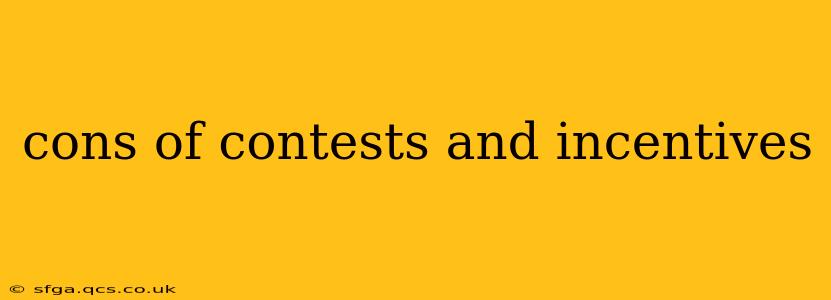Contests and incentives—they sound like a surefire way to boost engagement, increase brand awareness, and drive sales. And in many cases, they are! However, like any marketing tactic, they come with a potential downside. Understanding these drawbacks is crucial to ensuring your contest or incentive program doesn't backfire. This post will delve into the often-overlooked cons of contests and incentives, helping you make informed decisions about their implementation.
Are Contests and Incentives Always Worth It? A Critical Look at the Drawbacks
Before diving into specifics, let's establish a crucial point: the effectiveness of contests and incentives heavily depends on meticulous planning and execution. A poorly designed campaign can lead to more problems than benefits.
Potential Negative Impacts on Your Brand
1. Damaged Brand Reputation: The Risk of Negative Publicity
Poorly managed contests can severely damage your brand reputation. Consider these scenarios:
- Unclear rules and judging criteria: If the rules aren't transparent and the judging process isn't fair, you risk accusations of bias or dishonesty. This can lead to negative reviews, social media backlash, and damage to your brand's trustworthiness.
- Disappointed participants: When many participants don't win, feelings of frustration can emerge. This can lead to negative comments online, potentially impacting your brand image and discouraging future engagement.
- Low-quality entries: If the prize isn't appealing enough or the contest parameters are too vague, you might receive a deluge of low-quality submissions. This could reflect poorly on your brand's perceived standards.
2. Focus on the Prize, Not the Brand: Missing the Mark on Marketing Goals
While contests can drive engagement, the focus can shift entirely to winning the prize, leaving your brand message lost in the shuffle. Participants may not even remember your brand after the contest ends, rendering the entire endeavor ineffective from a marketing standpoint.
3. Increased Customer Service Burden: Managing Expectations and Complaints
Contests often lead to an influx of customer service inquiries. Participants may have questions about the rules, entry process, or eligibility. Managing these inquiries can strain your customer service resources and lead to delays in responding to other customer needs.
The Cost Factor: More Than Just the Prize
4. Hidden Costs of Contest Management: Time, Resources, and Potential Legal Issues
Running a contest is resource-intensive. You'll need to allocate time and resources for planning, promotion, judging, and prize fulfillment. Additionally, failing to comply with legal requirements (e.g., disclosure statements, contest rules) could lead to hefty fines and legal battles.
5. Ineffective ROI: Was it Worth the Investment?
The cost of running a contest—including prizes, advertising, administration, and potential legal fees—must be weighed against the return on investment (ROI). If the contest doesn't generate sufficient leads, sales, or brand awareness, it may have been a financially unwise decision.
Addressing Common Concerns: Frequently Asked Questions
How can I avoid negative publicity from a contest?
Transparency is key. Clearly define the rules, judging criteria, and eligibility requirements. Be prompt and professional in responding to inquiries. Consider having a neutral third party judge the entries to eliminate bias.
What if my contest doesn't attract many participants?
Analyze why your contest failed to attract participation. Was the prize unappealing? Were the rules too complicated? Was the promotion inadequate? Learn from your mistakes and adjust your strategy for future contests.
How can I ensure the contest aligns with my brand image?
Choose a prize and contest format that reflects your brand values and target audience. Ensure that the overall tone and messaging remain consistent with your brand's personality.
By carefully considering these cons and addressing potential pitfalls, you can create effective contest and incentive programs that deliver positive results without compromising your brand's reputation or bottom line. Remember, a well-planned and executed contest is a powerful tool; a poorly managed one can be detrimental.
